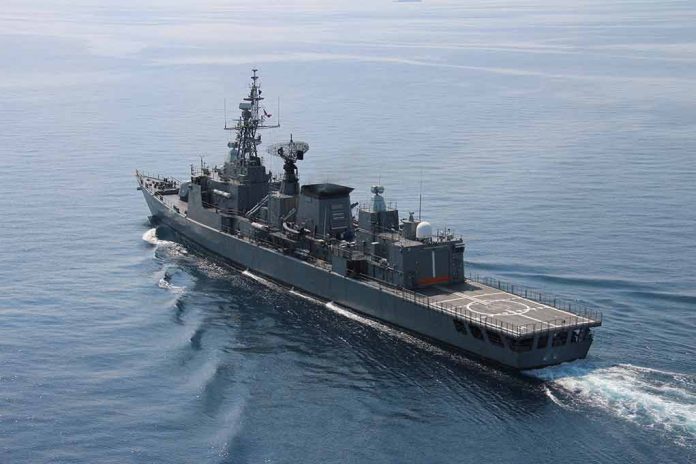
Finland seizes oil tanker suspected of sabotaging undersea power cable, raising concerns about Russia’s shadow fleet and maritime security.
At a Glance
- Finnish authorities detained the oil tanker Eagle S, suspected of involvement in cutting the Estlink-2 undersea power cable
- The vessel is believed to be part of Russia’s “shadow fleet,” used to evade Western sanctions
- The incident highlights growing concerns about the security of critical maritime infrastructure
- Finnish leaders emphasize the need to stop the shadow fleet to cut off funding for Russia’s war efforts in Ukraine
Finland Takes Action Against Suspected Russian Shadow Fleet Vessel
In a bold move against potential maritime sabotage, Finnish authorities have seized an oil tanker suspected of involvement in damaging a crucial undersea power cable. The vessel, named Eagle S, is believed to be part of Russia’s secretive “shadow fleet,” a group of ships allegedly used to circumvent international sanctions imposed following Russia’s invasion of Ukraine. This incident has thrust the issue of maritime security into the spotlight, particularly concerning critical infrastructure in the Baltic Sea region.
The Eagle S, registered in the Cook Islands, was detained as part of an ongoing investigation into the rupture of the Estlink-2 cable, which supplies electricity to Estonia from Finland. Finnish law enforcement is treating the case as “aggravated criminal mischief,” highlighting the seriousness of the allegations. The vessel’s movements, tracked between St. Petersburg, Russia, and Port Said, Egypt, have raised suspicions about its true purpose and allegiances.
Finland detained an oil tanker it says was part of Russia's 'shadow fleet' helping fund its war in Ukraine https://t.co/gE2sMoWSpR
— Business Insider (@BusinessInsider) December 27, 2024
The Shadow Fleet: A Tool for Sanction Evasion
Russia’s “shadow fleet” consists of aging ships repurposed to help bypass Western sanctions imposed after the outbreak of hostilities in Ukraine in 2022. These vessels operate under a veil of secrecy, often changing ownership and flags to obscure their ties to Russia. The scale of this operation is significant, with over half of the vessels exporting Russian oil in November identified as shadow tankers.
Finnish Prime Minister Petteri Orpo has emphasized the urgency of addressing this issue, stating that the shadow fleet directly contributes to funding Russia’s military operations in Ukraine. The detention of the Eagle S represents a concrete step in Finland’s efforts to disrupt this clandestine network and its potential threat to regional security.
“The shadow fleet pumps money into Russia’s war fund so that Russia can continue to wage its war in Ukraine against the people of Ukraine, and it has to be stopped,” said Orpo.
Broader Implications for Maritime Security
The incident involving the Eagle S is not isolated. It follows a series of troubling events in the Baltic Sea, including the cutting of data cables in November that affected connections between Germany, Finland, Sweden, and Lithuania. These occurrences have raised alarm bells about the vulnerability of undersea infrastructure to sabotage.
German Foreign Minister Boris Pistorius has suggested that these incidents might be deliberate acts of sabotage, though concrete evidence is yet to be presented. The frequency and pattern of these events have heightened concerns among NATO allies about the security of critical maritime infrastructure, particularly in light of ongoing geopolitical tensions with Russia.
“We have to assume, without certain information, that the damage is caused by sabotage,” said German Foreign Minister Boris Pistorius.
As investigations continue, the international community remains on high alert. The seizure of the Eagle S by Finnish authorities serves as a stark reminder of the complex challenges facing maritime security in an era of hybrid warfare and economic sanctions. It underscores the need for increased vigilance and cooperation among nations to protect vital undersea infrastructure and combat the evasion of international sanctions.






















